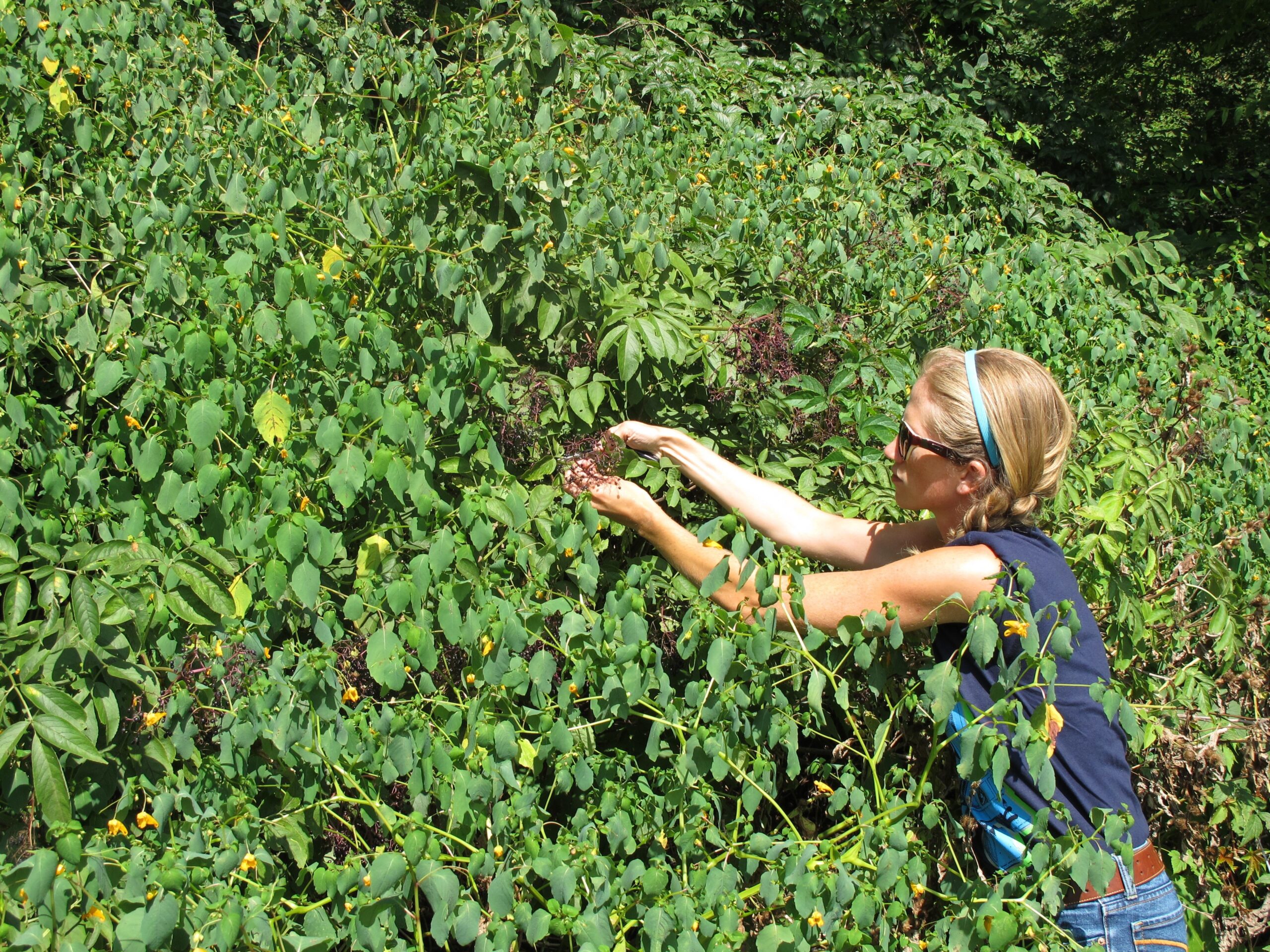
This is a part of “A Year in the Wild Kitchen of the Great Lakes,” a series in partnership with expert forager Lisa M. Rose, with the mission of nurturing a deeper connection with the natural world through foraging. To get started with your foraging journey, begin here with our “Framework to Sustainable and Safe Practices” and check out part one of “Winter Wellness Pantry” for tips and tricks to stay healthy this winter with wild herbs of the Great Lakes.
Scenario. It’s 4am. You wake up, chilled and slightly feverish. That little voice in your head whispers to you, “You are sick.” In denial, you toss and turn, hoping that you haven’t caught that cold that’s been going around the office. But the voice continues to nag. You choose to listen. Instead of falling back asleep, you head to the kitchen and reach for the elderberry elixir and turn on the kettle to brew a hot cup of your own hand-foraged Great Lakes Kitchen Wildflower Cold & Flu Tea with a large dollop of raw, local honey.
Using plant medicines like elderberry elixir at the first signs of a cold or flu can shorten the lifespan of a virus. Medical research has shown that the use of elderberry elixir within the first 48 hours of the start of a virus can relieve symptoms by as much as 4 days. With that in mind, you’ll want to have your own stockpile of elderberry elixir on hand for when illness strikes.
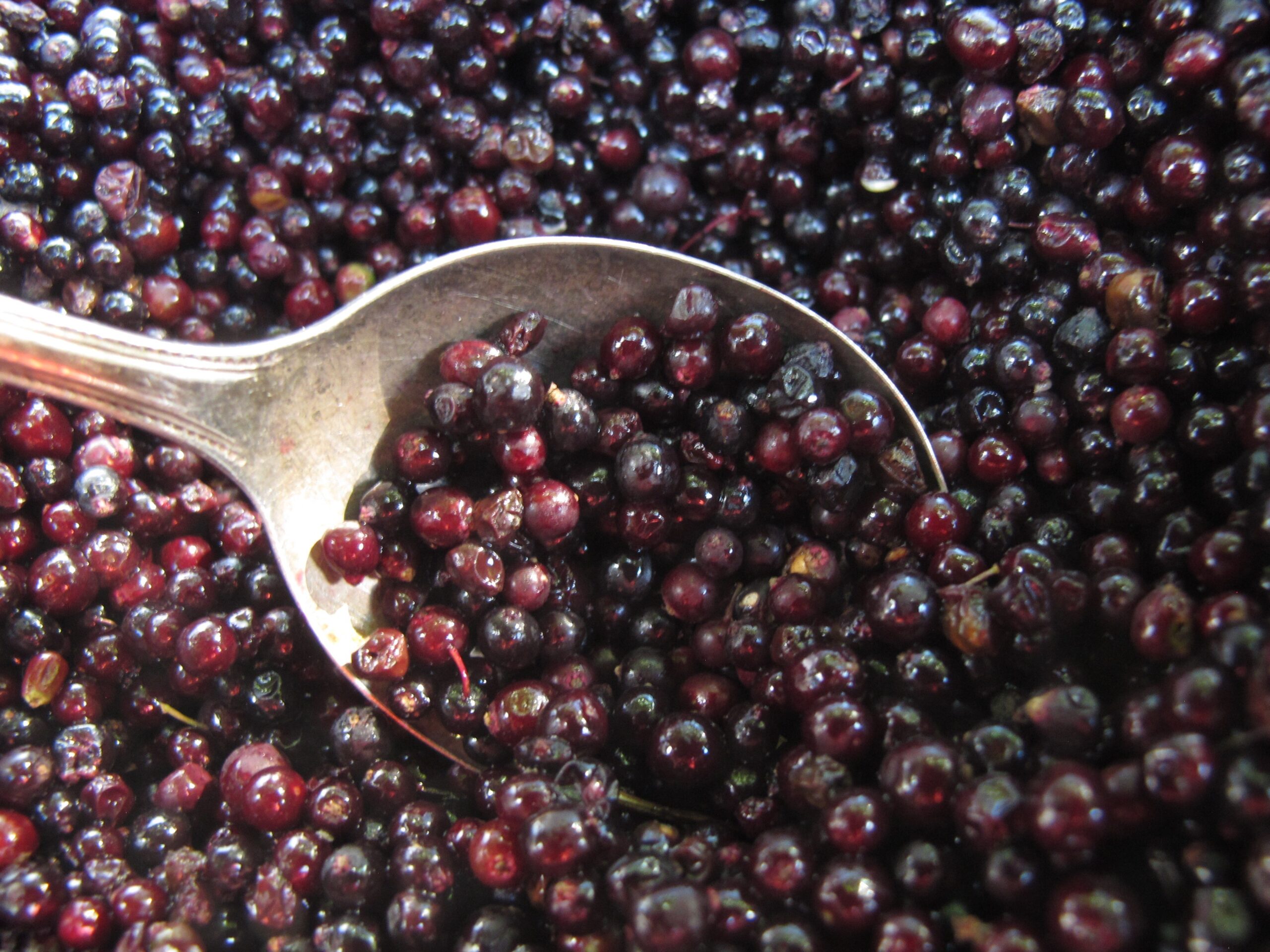
Fresh elderberries ready for elixir. (Photo Credit: Lisa M. Rose)
Meanwhile, also have on hand local honey, crafted by bees using plants from your immediate surroundings, to support your immune system — especially when it is raw and unpasteurized. Unlike most commercially sold honey, raw honey retains its beneficial enzymes. Additionally, local raw honey embodies the unique terroir of its region, enhancing its flavor and purported medicinal value.
While your local health food shop will have a variety of brands of elderberry elixir for your apothecary, it is an herbal remedy that’s easy to make at home. In under an hour’s time, you can make a large batch of elderberry elixir that can keep you and your family well all winter long for a fraction of the cost of retail products.
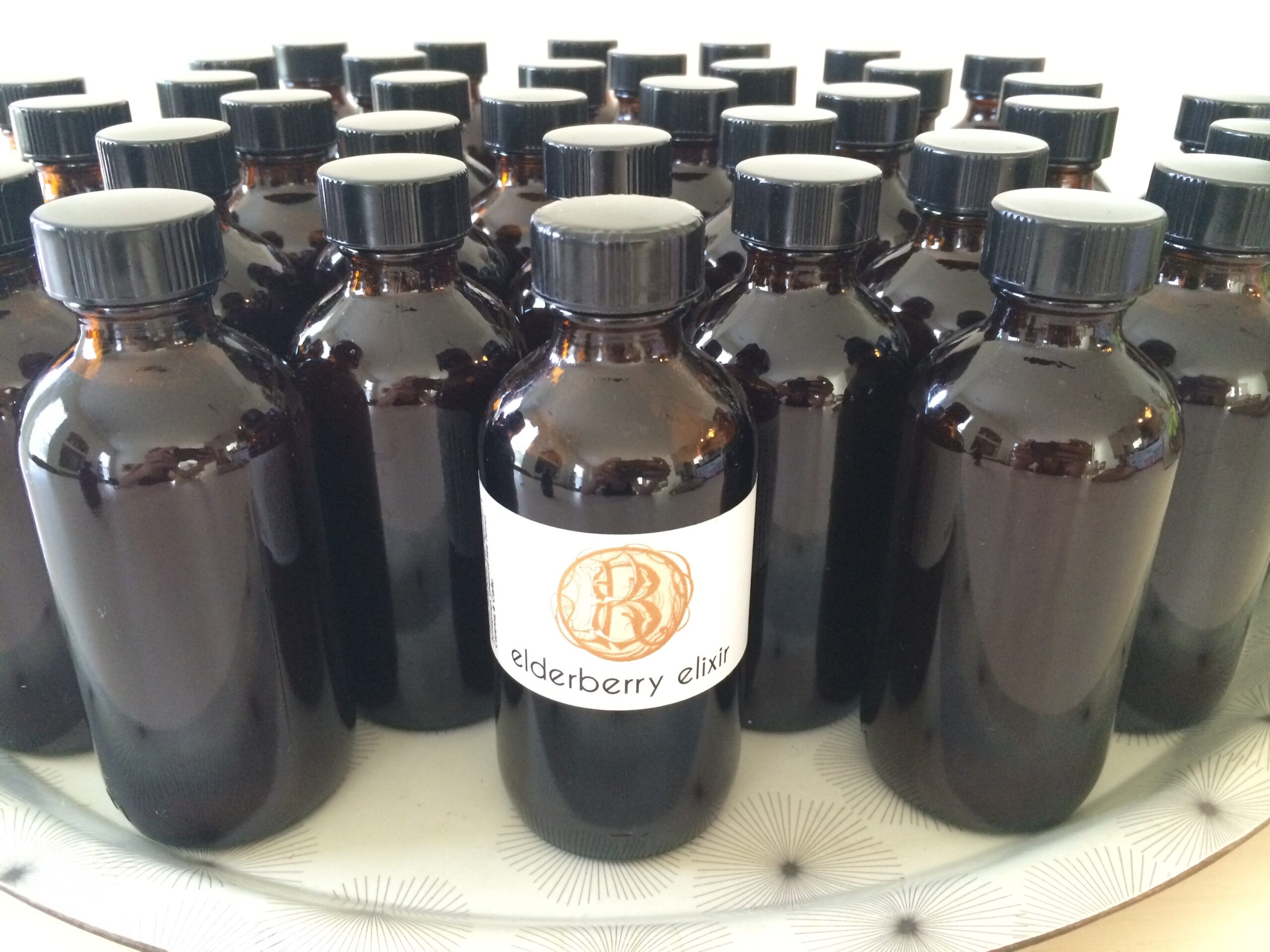
Elderberry put up in jars for winter’s elderberry syrup. Elderberry has a long-standing history of use against viral infections. Use it at first signs of illness. (Photo Credit: Lisa M. Rose)
The Great Lakes Kitchen: DIY Elderberry Elixir (makes 1 quart)
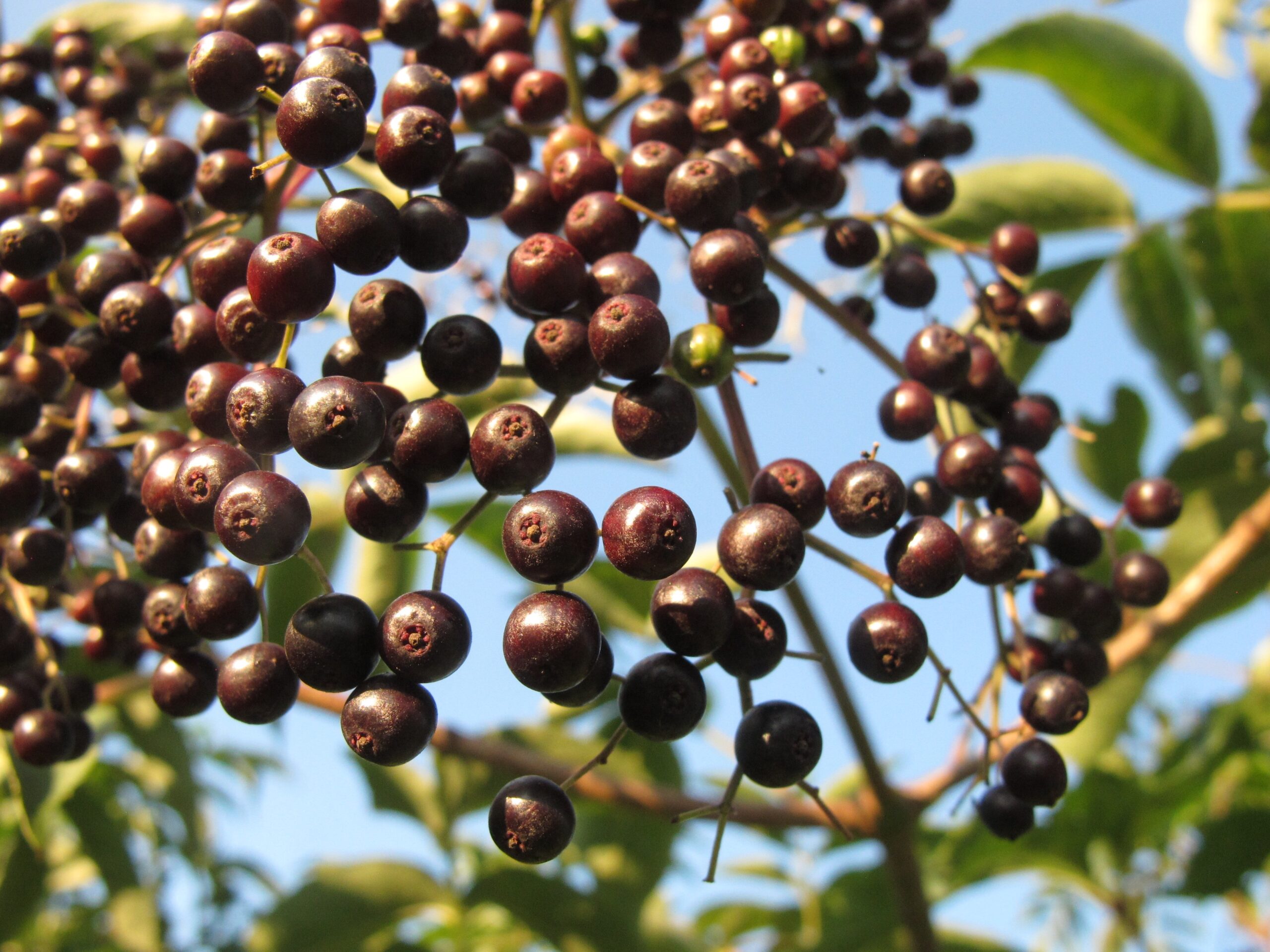
Elderberries hang as heavy umbels of fruit in mid-August. (Photo Credit: Lisa M. Rose)
Ingredients
- 1 cups dry or fresh elderberries (Sambucus nigra)**
- 2 cups water
- 2 TBSP fresh ginger, peeled and chopped (optional)
- 1 cup 40% alcohol
- 1 cup raw local honey
- 1 quart size canning jar
- Small bottles for dispensing
Directions
In a large saucepan, heat the elderberries, ginger and water. Bring to a boil, reduce heat then simmer for 20 minutes. Press and strain elderberry ginger mixture into a quart size canning jar. Stir in 1 cup honey and 1 cup alcohol to preserve the mixture. Shake well to mix. Can be bottled into smaller bottles for dispensing. The elderberry elixir will keep in the refrigerator for 6 months.
Use
At the first signs of a cold or flu, take 2 TBSP of elderberry on the hour, for up to 5 days.
**Elderberry (Sambucus nigra) is abundant across North America and its berries can be foraged from the wild across much of the United States. No time for foraging? Order dry elderberries online from reputable herbal sources like Mountain Rose Herbs or choose to buy local from an herbalist in your area.

For more ways to use these and other wildly foraged plants for both food and medicine, check out “Midwest Medicinal Plants” and “Midwest Foraging” by our contributor, Lisa M. Rose. (Photo Credit: Lisa M. Rose)
About the Author
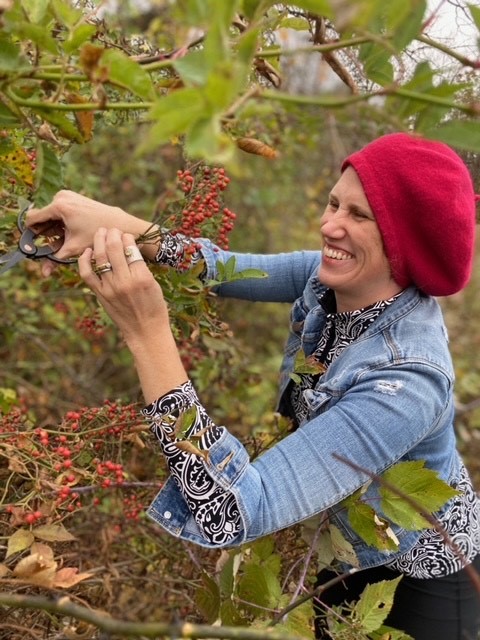
Lisa M. Rose is an ethnobotanist, wild foods chef, and author with a profound dedication to exploring the symbiotic relationship between humans and plants. With an academic background in anthropology and community health, her culinary journey has been rich and varied, including stints with notable establishments and figures such as Stags Leap in Napa Valley, Alice Waters’ The Edible Schoolyard, and organic farmers in Northern Michigan.
Rose’s work is celebrated in her bestselling books, “Midwest Foraging” and “Midwest Medicinal Plants,” among others and her expertise is frequently sought by major media outlets, including the Chicago Tribune, PBS, NPR, Martha Stewart and CNN.
Catch more news at Great Lakes Now:
A Foraged Great Lakes Woodland Chai Tea
Foraged Fruit and Nuts: Wild Apples & Abundant Acorns
Featured image: Lisa M. Rose gathering fresh elderberries at the height of summer for winter’s elderberry elixir. (Photo Credit: Lisa M. Rose)




